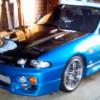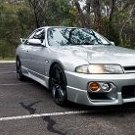Servicing Your Skyline
Announcements
-
Similar Content
-
Latest Posts
-
By Julsmadrid · Posted
Thanks GTSboy. I will inspect the valves actually, is this something I can do while they are still in the head? The block/bores don’t look bad to be honest hey, I can still see the cross hatches in the bores and they still measure 86.5mm. I’m not sure how to measure the installed ring gaps but I will do that and take it to someone who can. -
I’ve had the same headache with my lowered car, scissor jack first then floor jack every time. Ended up grabbing an extra-low profile aluminum jack (about 70mm entry height) and it finally slides under the lip without drama.
-
By shubby0901 · Posted
Its been a while! Finally thought to do something on this car, so here we go. This will be a slow burning, multiple posts as I spend 0.5-1hr a day on this job, over multiple days... Full set of GKTech suspension arms! Step 1: Buy Arms, done! Step 2: Start removing stuff. HICAS was easy. Rear suspension arms are now gone, they were a bitch but breaker bars with long handle extensions, 2 1.5hr slots later, stock arms are off! Next step, remove the hubs and take them to work to press out the bearings and bushings! -
I guess. The diff and the speedo are gearbox agnostic.
-







Recommended Posts
Create an account or sign in to comment
You need to be a member in order to leave a comment
Create an account
Sign up for a new account in our community. It's easy!
Register a new accountSign in
Already have an account? Sign in here.
Sign In Now